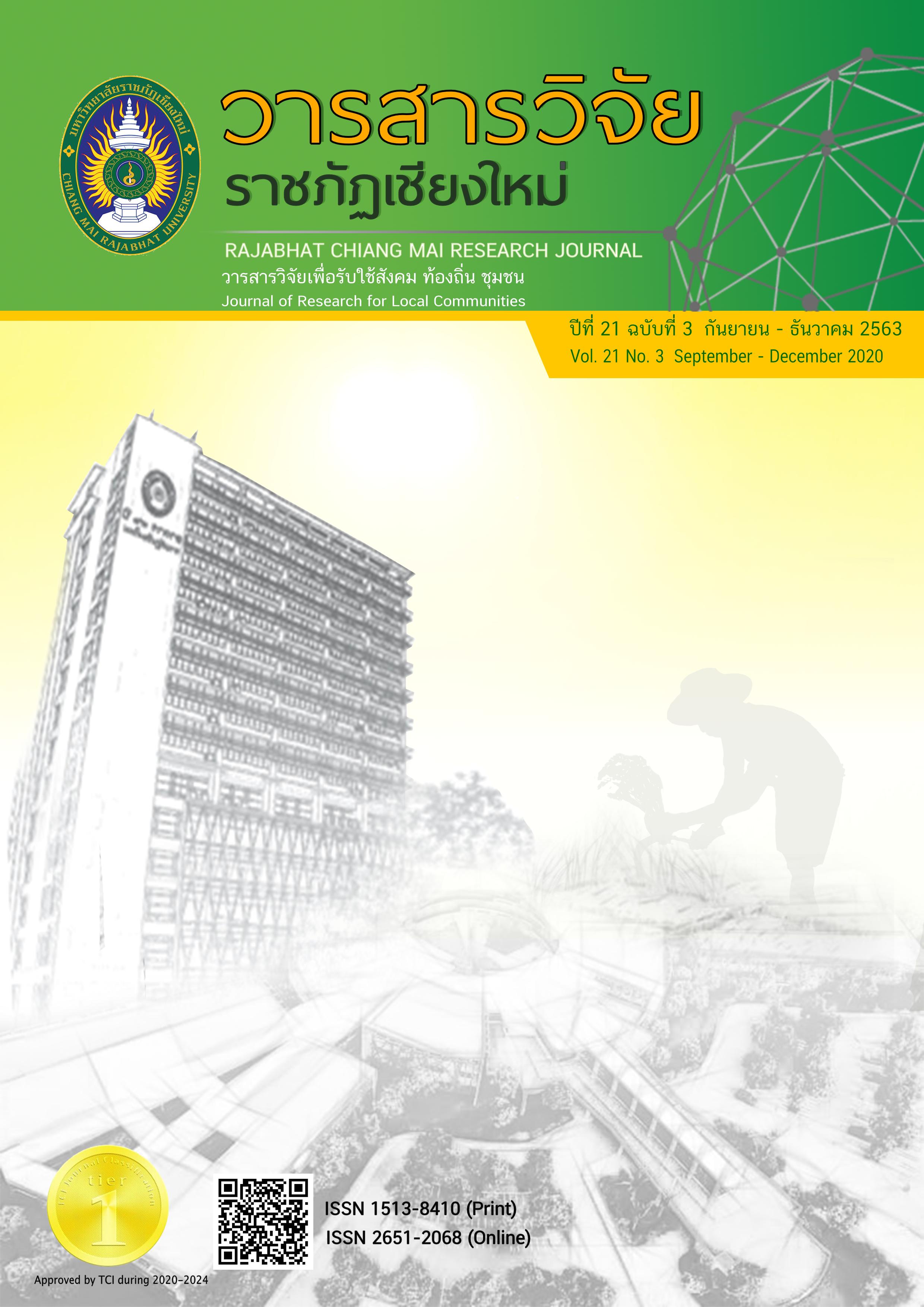The Development of Science Process Skills and the Scientific Mind of Grade 7 Students by Using POGIL
DOI:
https://doi.org/10.14456/rcmrj.2020.241560Keywords:
POGIL, Science process skills, The scientific mindAbstract
The objectives of this research were 1) to compare the science process skills of the students before and after using the POGIL, and 2) to study the scientific mind of the students during the lessons and after finishing the lessons with using the POGIL. The research sample was 33 of grade 7 students in the academic year of 2019 in Phiangluang 1 Under The Royal Patronage of Hrh Princess Ubolratana Ragkanya Sirivadhana Parnavadi which was chosen by cluster random sampling. Research tools included 7 learning management plans using the POGIL, scientific process skills test, and the scientific mind observation form. Content validity Quantitative data were analyzed by average, percentage, standard deviation, percentages and gain scores, and t-test. Qualitative data were analyzed by content analysis, issue summary, and descriptive explanation.
The results showed that 1) after using the POGIL, students have significantly improved science process skills higher than prior to the experiment at 0.01 level of significance, and 2) after using the POGIL, students had the scientific mind by self-assessment and by-teacher-assessment score at a very good level. The observation from the author showed the improvement of the scientific mind of the students in the first twelve hours. The level dropped between hours thirteen and fifteen. It became better again after hours sixteen and twenty-one.
Downloads
References
Ministry of Education. (2014). Guidelines for measuring and evaluating learning outcomes according to the Basic Education Core Curriculum 2008. Bangkok: Department of Academic Affairs, Ministry of Education. (In Thai)
Napneo, K., Jaisanit, P., & Pali, J. (2017). Development of Science learning achievement, Science process skills, and scientific mind of Mathayomsuksa 3 students in Science strand by using ATLAS technique. Graduate School Journal Chiang Rai Rajabhat University, 10(2), 99-110. (In Thai)
Phutato, K. (2015). Effects Of Using Process Oriented Guided-Inquiry Learning (Pogil) On Chemistry Concepts And Analyzing Ability Of Upper Secondary School Student. Bangkok: Chulalongkorn University. (In Thai)
Hnoodam, K., Vipavin,V., & Napatthalung, N. (2013). Learning achievement and scientific mind of Prathomsueksa 5 students taught by the 7E learning cycle in combination with scientific toys. (Master of Education in Curriculum and Instruction, Faculty of Education Thaksin University). (In Thai)
Srisaad, B. (2013). Preliminary research. (8 Edition). Bangkok: Suveeriyasan. (In Thai)
Nueachalern, P. (2015). 21st century learning in Science. Journal of Rangsit University: Teaching & Learning, 9(1), 136-154. (In Thai)
Klomdee, P. (2018). The results of development on basic Science process skills of Grade 5 students by using Science skill practice packages with inquiry-based instruction (5E). Veridian E-Journal Silpakorn University, 11(1), 2004-2020. (In Thai)
Ladachat, L. (2018). Teaching Science as Science: history, philosophy and education. Bangkok: Chulalongkorn University Press. (In Thai)
Duangpummet, W., & Kaewurai, W. (2017). Learning management in the Thailand 4.0 era with active learning. Humanities and Social Sciences Journal of Graduate School Pibulsongkham Rajabhat University, 4(2), 53-65. (In Thai)
National Institute of Education Testing Service. (2017). The scores of the Onet Science test of Mathayomsuksa 3 students. Phiangluang1 under the Royal Patronage of Her Princess Ubolratana Ragkanya Sirivadhana Parnavadi. Retrieved from http://www.niets.or.th (In Thai)
The Institute for Promotion of Teaching Science and Technology. (2013). Manual for promoting the teaching of Science for Mathayomsuksa 1 students. Bangkok: Ministry of Education. (In Thai)
Aktamıs, H., & Yenice, N. (2010). Determination of the science process skills and critical thinking skill levels. Procedia-Social and Behavioral Sciences, 2(2), 3282-3288.
Criasia, R., Lees, A., Mongelli, M., Shin, Y.-G., Stokes-Huby, H., & Vitale, D. (2009). Nonlinear POGIL for Developing Cumulative Skills and Multidisciplinary Chemical Concepts for Non-science and Chemistry Majors Chemistry Education in the ICT Age. Springer.
De Gale, S., & Boisselle, L. N. (2015). The Effect of POGIL on Academic Performance and Academic Confidence. Science Education International, 26(1), 56-79.
Geiger, M. (2010). Implementing POGIL in allied health chemistry courses: insights from process education. International Journal of Process Education, 2(1), 19-34.
Hanson, D. M. (2006). Instructor's guide to process-oriented guided-inquiry learning. Lisle, IL: Pacific Crest.
Kanjanawasee, S. (2013). Classical test theory. (7thed.). Bangkok: The publisher of Chulalongkorn University. (In Thai)
Kussmaul, C. (2012). Process oriented guided inquiry learning (POGIL) for computer science. In Proceedings of the 43rd ACM technical symposium on Computer Science Education. ACM.
Das, N., Amrita, & Singh, A. (2014). Importance science in school curriculum. WeSchool Knowledge Builder - The National Journal, 8(1), 546-556.
Marzano, R. J. (2000). Designing a new taxonomy of educational objectives. Thousand Oaks: CA.
Downloads
Published
How to Cite
Issue
Section
License
1. Articles, information, content, images, etc published in the “Community and Social Development Journal” are copyrighted by the Community and Social Development Journal, Chiang Mai Rajabhat University. In order to properly distribute the articles through print and electronic media, the authors still hold the copyright for the published articles under the Creative Commons Attribution (CC BY) license, which allows the re-distribution of the articles in other sources. References must be made to the articles in the journal. The authors are responsible for requesting permission to reproduce copyrighted content from other sources.
2. The content of the articles appearing in the journal is the direct responsibility of the article authors. The editorial board of the journal does not necessarily agree with or share any responsibility.














